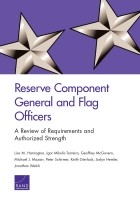| 来源类型 | Research Reports
|
| 规范类型 | 报告
|
| DOI | https://doi.org/10.7249/RR1156
|
| ISBN | 9780833090980
|
| 来源ID | RR-1156-OSD
|
| Reserve Component General and Flag Officers: A Review of Requirements and Authorized Strength |
| Lisa M. Harrington; Igor Mikolic-Torreira; Geoffrey McGovern; Michael J. Mazarr; Peter Schirmer; Keith Gierlack; Joslyn Fleming; Jonathan Welch
|
| 发表日期 | 2016
|
| 出版年 | 2016
|
| 页码 | 144
|
| 语种 | 英语
|
| 结论 |
Authorizations Are Sufficient- The services report that RC G/FO authorized strength and exemptions are sufficient for the effective management and leadership of the reserve component.
- Exemptions to the basic authorized strength are appropriate in both structure and number.
Services Are Appropriately Managing and Accounting for RC G/FO Positions- The services' current requirements and authorizations processes work but would benefit from a systematic, comprehensive review process.
- The number of RC G/FO requirements exceeds the authorized strength.
- The services' methods for ensuring compliance with RC G/FO authorized strengths are adequate but would benefit from a consistent tracking and reporting method used by all the services.
- Authorized strength should not be tied to fluctuations in end strength or the use of RC G/FOs in times of war or national emergency.
There Are Potential Opportunities to Eliminate or Downgrade RC G/FO Requirements- A small number of candidate positions could, after review by the services, be considered for downgrading or elimination but the vast majority of RC G/FO positions are well justified.
- Positions described as mobilization assistants or National Guard assistants are the requirements category that raises the most questions.
- There are few opportunities to convert RC G/FO positions to senior-level civilian positions.
- RC G/FO requirements that have emerged since 9/11 broadly reflect the needs of the past 15 years, but should be reviewed as operational requirements change.
|
| 摘要 |
- Congress and DoD should maintain the current system of basic authorized strength plus individual exemptions.
- Develop guidelines for evaluating and validating RC G/FO requirements.
- Institute methods for DoD-wide tracking of reserve component general and flag officer authorized strengths.
- Resist attempts to link RC G/FO limits to total service or component end strength.
- The services and joint organizations should review the positions identified in our analysis to ensure these remain valid RC G/FO requirements.
- OUSD(P&R) should assist the services and the Joint Staff in establishing overarching guidance on how RC G/FO IMAs should be used and the roles they should play.
- OUSD(P&R) should assist the services in establishing guidance regarding the overall nature of positions described as mobilization assistants or National Guard assistants.
- The services and joint organizations should review RC G/FO requirements established during the last 15 years.
- Future reductions in general and flag officer requirements or authorizations should not disproportionately affect those positions that are viewed as developmentally crucial.
- Best practices, ideas, and insights from current leader development efforts in the services should be shared to catalyze further experimentation and innovation in leader development.
|
| 主题 | Military Budgets and Defense Spending
; Military Career Field Management
; Military Officers
; Military Reserves
|
| URL | https://www.rand.org/pubs/research_reports/RR1156.html
|
| 来源智库 | RAND Corporation (United States)
|
| 引用统计 |
|
| 资源类型 | 智库出版物
|
| 条目标识符 | http://119.78.100.153/handle/2XGU8XDN/108247
|
推荐引用方式
GB/T 7714 |
Lisa M. Harrington,Igor Mikolic-Torreira,Geoffrey McGovern,et al. Reserve Component General and Flag Officers: A Review of Requirements and Authorized Strength. 2016.
|
|
文件名:
|
x1495316234581.jpg
|
|
格式:
|
JPEG
|

|
文件名:
|
RAND_RR1156.pdf
|
|
格式:
|
Adobe PDF
|
除非特别说明,本系统中所有内容都受版权保护,并保留所有权利。